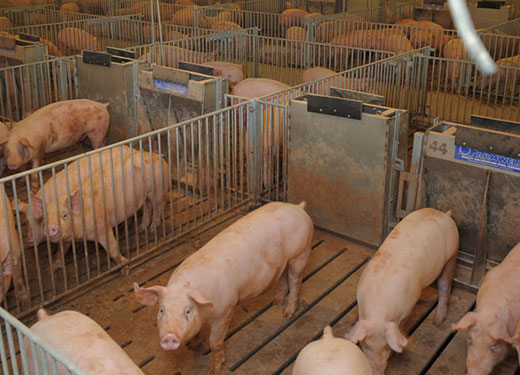
The pork industry will have a new risk management tool when the CME Group launches new pork cutout futures and options in early November. | Download this photo.
New cutout futures will help pork industry with risk management, K-State’s Tonsor says
CME Group to launch new contracts that will reflect wholesale product price after processing
Oct. 5, 2020
MANHATTAN, Kan. – The CME Group’s plan to launch pork cutout futures and options on Nov. 9 is good news for pork buyers as well as producers, a Kansas State University agricultural economist said.
“There indeed is significant interest from U.S. and Canadian hog producers in having additional risk management alternatives available,” said Glynn Tonsor, livestock market specialist with K-State Research and Extension.
Tonsor was responding to a Sept. 29 CME Group announcement that it plans to launch Pork Cutout futures and options on Nov. 9.
A “cutout” is the approximate value of a hog calculated using the prices paid for wholesale cuts of pork. The values, or cuts, used to calculate the pork cutout include the loin, butt, picnic, rib, ham and belly. The new contracts will reflect the price of the wholesale product after processing. CME Group is a global marketplace for agricultural and other derivatives.
“As the market has evolved, our customers continue to look for new tools to manage the price risk associated with hog and pork production,” said Tim Andriesen, CME Group Managing Director of Agricultural Products, in the statement.
“Over time, more and more marketing contracts include a pork cutout component,” Tonsor said. “Combined, CME’s introduction of a Pork Cutout contract will enable interested hog producers, as well as pork buyers and sellers, to possibly adjust their risk management strategies. While much attention has come from the possible benefits from a hog producer’s perspective, the observed wholesale pork volatility during the pandemic likely corresponds with strong interest from pork buyers seeking ways to mitigate pork purchase price risks they face.”
Information about how futures and options are used to manage risk in livestock markets is available on the CME Group’s website.
Even with the welcome introduction of the new resource, context is important, Tonsor said.
“The role of specific futures and options contracts varies over time. For instance, the pork belly futures contract was a pioneering financial instrument in the 1960s that ultimately changed along with broader industry developments in the belly – where we get bacon – market. More broadly, it will be important to monitor the final up-take on this (cutout) product and what implication that has directly for not only its viability, but the indirect impacts on viability of other products including CME’s Lean Hog futures and options products.”
The new contracts will be quoted in U.S. cents per pound, will have a contract size of 40,000 pounds and will be available for trading on CME Globex or through block trades via CME ClearPort.
Tonsor said the new contract brought to mind the role of pork belly futures in the 1980s Eddie Murphy movie, Trading Places.
More information about livestock markets is available at AgManager.info.

